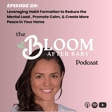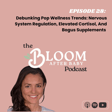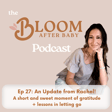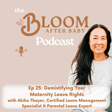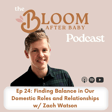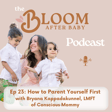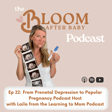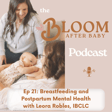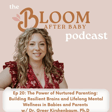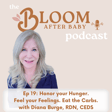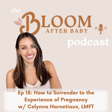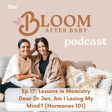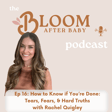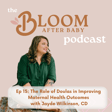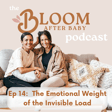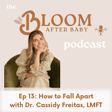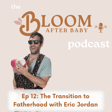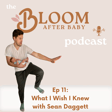
10. How to Connect with your Soul Self: a Body Gratitude Practice, with Amy Quinn, LCSW, CEDS
Join us in the resistance against "Bounce Back Culture" with Amy Quinn, LCSW, as she leads us through a grounding mindfulness exercise and a raw conversation about the body image challenges many women face during pregnancy and postpartum.
Amy will help you better understand how you can connect with your true "soul self" and embrace the many changes that your body will experience during this time, and really, through your entire lifespan.
You can learn more about Amy's private practice (in California) and her womens wellness retreats (think tropical destinations and swimming with wild dolphins!) at her website www.amyquinn.com. You can also email her directly at amyquinnlcsw@gmail.com or find her on instagram @amyquinnlcsw
Links and resources mentioned in the episode:
Generation Mindful "Time-in" Toolkit
The power of proprioceptive input for sensory and emotional regulation
Postpartum Support International Helpline and Mental Health Support
South Bay (Los Angeles Beach Cities) Mommy and Me
South Bay (Los Angeles Beach Cities) Eating Disorder Coalition
Dr. Jen's Practices for Connecting with Future You
You can learn more about Rachel's California-based group therapy practice and how you can work with her at www.racheldaggettlmft.com or on instagram @rachelscouch
If you enjoyed this episode and appreciate what we share here, we would be so honored if you shared the show and followed us @bloomafterbaby on instagram so that we can connect with you and reach more mamas!
We’d also be so grateful if you would rate and review our podcast in your favorite podcast app, because that’s the best way for a new podcast to get more people to listen so we can keep growing!
*Please note that this podcast is intended for educational purposes only, and is not a substitute for seeking individualized care from a mental health or medical professional"
Learn more about us and access all of our courses, coaching services, and free resources at bloomafterbaby.com
Pregnancy tips Postpartum wellness Prenatal care New motherhood Postpartum recovery Maternal health Pregnancy journey Expectant mothers Postpartum support Motherhood experience Parenting advice Family dynamics Parenting tips Raising children Family well-being Parenting challenges Family relationships Parenting insights Mental health for mothers Emotional well-being Health at Every Size Coping with motherhood Maternal mental health Self-care for moms Stress management Emotional resilience Conversations with experts Interviews with mothers Real-life parenting stories Expert advice for moms Support for new mothers Insights on motherhood Informative parenting discussions Working moms Empowering mothers Couples therapy Psychotherapy Breastfeeding tips Sleep during pregnancy Postpartum nutrition Marriage and Family Marriage after baby Balancing work and motherhood Pregnancy self-care Healthy pregnancy habits Relationships Intuitive Eating Mindfulness Body Acceptance
